
In the midst of the challenges facing Britain, both spiritually and financially, it is essential to recognize the relative privilege that comes with being born in a society where harsh persecution is not the norm. While Britain grapples with its own issues, the global landscape reminds us that religious persecution, especially of a severe nature, is a widespread reality.
Nowhere exemplifies this more starkly than Iran. Once a nation with a growing respect for free thought and religious minorities, Iran underwent a radical transformation following the 1979 Islamic Revolution. Since then, it has been under the firm control of successive Ayatollahs and unconventional presidents.
The recent report by Article 18, a British charity dedicated to defending and promoting religious freedom in Iran, sheds light on a renewed crackdown on Christianity in the country. According to their findings, 69 Christians have been arrested in recent weeks, with converts from Islam being the primary targets. Iranian law considers apostasy from the state faith a capital offense, leaving the punishment to the discretion of the judge.
Efforts to gather anonymous testimonies from local Christians through human rights charities were hindered by escalating security concerns, highlighting the dangerous environment in which these individuals find themselves.
Steve Dew-Jones, the News Director of Article 18, expressed his concern about the recent wave of arrests, stating that each arrest represents an individual whose life has been abruptly turned upside down. Kiri Kankhwende from Christian Solidarity Worldwide added that these actions are designed to intimidate congregations and discourage potential converts from embracing Christianity.
The Christian community in Iran, with a history dating back two thousand years, faces significant challenges. While some denominations are officially recognized by the Iranian constitution, such as the Chaldean and Armenian denominations, they still experience harassment from the state. The campaign includes arrests, often on security charges, and demands for exorbitant bail amounts intended to bankrupt congregations and individuals.
Dew-Jones explained that the officially recognized churches are allowed some freedom to worship, but the real issue lies in conversion, perceived as a threat to the Islamic Republic’s core values.
The recent wave of arrests is not seen as directly linked to the protests that began following the death of Mahsa Amini. However, it is viewed in the broader context of a renewed crackdown on civil liberties, echoing the heightened efforts of the morality police since the protests in the previous autumn.
Under the current regime, prospects for Christians in Iran appear grim. Those recognized as Christians may practice their faith under restrictions, while unrecognized individuals, including converts, must worship in private homes, often facing the constant risk of raids.
Article 18 calls on the international community to prioritize human rights and religious freedom in any negotiations with Iran. They urge the UK government to proscribe the Islamic Revolutionary Guards Corps (IRGC), responsible for many raids on Christians, and to offer a safe legal route for Christians fleeing Iran to seek asylum elsewhere.
Despite the ongoing plight of Iranian Christians, it seems that Britain lacks the moral or political resources to significantly impact their cause. The international community is urged to address these human rights violations and work towards ensuring religious freedom for all in Iran.
Leave a Reply